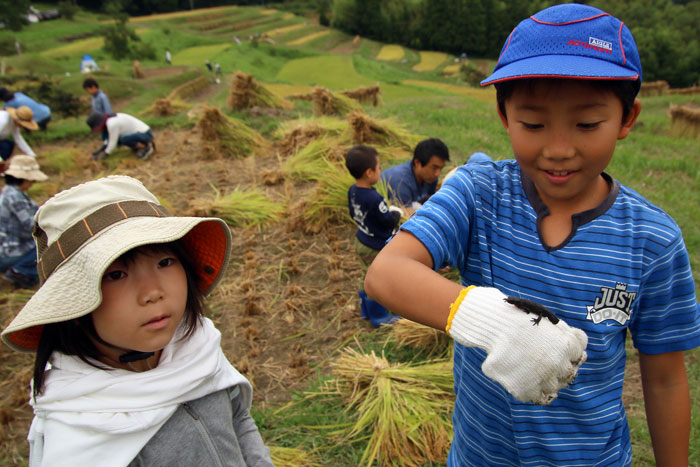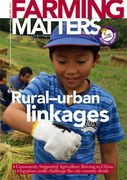There are many benefits from strong rural–urban linkages. Amongst others, consumers access healthy, ecologically produced food and build connections with producers, while farmers access fair markets that value their way of life. As seen here, it is for these reasons that both farmers and consumers work together to strengthen the connections between rural and urban.
India: Learning lunch with nature
How do you get your wonderful lunch? Is it because you can afford it or because somebody has worked to produce it? Where do you think your food comes from, and where will it come from in the future? These are some of the questions attracting hundreds of residents from Mumbai and Pune to Saguna Baug. Saguna Baug is Chandrashekhar Bhadsavle’s 50 hectare multifunctional farm combining agrotourism with cereal crops, multipurpose trees, livestock and aquatic fauna. Restoring the dignity of farming as a vocation was the main objective behind transforming the farm into an agrotourism hub. Over the past 20 years, the farm has developed into a place where leisure and learning merge and provide opportunities for farmers and urban residents to interact. This rural–urban interface brings visitors close to nature where they can learn and practice food production. The visitors can enjoy bird watching, water sports, purchase the farm’s produce or get involved with farming activities by working. They gain a better appreciation of some of the challenges and pressures farmers face. And, “appreciation not only ignites confidence but restores dignity too,” says Bhadsalve, who is acutely aware that restoring farmers’ confidence in farming is crucial to reversing rural outmigration. This initiative has other benefits too. Agrotourism accounts for 40% of the income from Saguna Baug, the farm now employs 60 local youth and, as consumers learn how their food is produced they are reshaping their eating habits.
Fore more information, contact Sudhirendar Sharma (sudhirendarsharma@gmail.com). Sudhirendar works at The Ecological Foundation in New Delhi, India and researches and writes on agriculture and related development issues.
Basque Country: Peasants connect with cities
In Basque Country (Spain) the severe economic crisis of the past few years coupled with unprecedented levels of youth unemployment, is opening space for agriculture as a new opportunity, especially among young people. They are seeking to build a decent future on the land, a future linked to the production of quality food, and another way of life. Interestingly, many of these are urban youth who were born and raised in the cities and towns of Basque Country (a trend in many other countries too, see this contribution). In parallel, Basque Country is a breeding ground for a large number of dynamics that link urban citizens to producers in the countryside. These include a growing number of consumer networks around small scale farmers, trading initiatives based on high quality peasant production, and various initiatives to revive local markets through direct sales. These innovations are central in the socio-political agenda and strategies of farmer organisations, especially for the Basque farmers’ union (EHNE Biscay), a member of La Via Campesina.
For more information contact bizkaia@ehnebizkaia.eus.
United Kingdom: Growing communities
Growing Communities is a successful social enterprise that builds community-led alternatives to the current damaging food system (www.growingcommunities.org). They began 18 years ago and the team now numbers 25 part-time staff. They provide a direct connection between farmers and consumers in a number of ways and it is this diversity that makes their enterprise unique. Through a box scheme, more than 3000 people receive fresh, local organic vegetables each week. Growing Communities also set up the Stoke Newington farmers’ market where about 25 local farmers sell direct to the public every Saturday. And, on top of these marketing initiatives, Growing Communities has a ’Patchwork Farm’ scattered across Hackney in East London. From 12 small market gardens and plots of about 100 m2 each, they produce two tonnes of salad leaves each year. And this is complemented by a wider variety of fruit and vegetables produced at Dagenham Farm, which is about three quarters of a hectare. Urban growing apprentices are trained each year on these farms and the group also supports other communities wishing to build their own alternative food systems. Through a ‘start-up programme’ that offers workshops, financial tools, practical support and interest-free loans, more than ten groups across the UK have since set up their own box schemes.
For more information contact Richenda Wilson (growcomm@growingcommunities.org)
Ecuador: 250,000 families to lead the food transformation
Frustrated by their government’s inability or disinterest in seriously addressing the unwanted human health, social and environmental consequences tied to industrial food, Ecuador’s National Agroecology Collective (or Colectivo) launched an ambitious initiative to recruit 250,000 families to commit at least half of their existing food budget to ‘responsible consumption’: pesticide- and GMO-free, locally sourced, culturally empowered, sustainable food. Together, this would represent some US$300 million per year – a sizeable investment in the sought after transition to healthier food. In the words of a concerned mother: “If the government is unwilling to represent our interests, then we must take things into our own hands.” To recruit the 250,000 families (roughly 5% of the country’s population), the Colectivo, a loose network of some 300 organisations, is both reinforcing its tried-and-tested methodology of sensorial food workshops as well as piloting a game in which participating families complete a series of challenges to self-evaluate the quality and effects of their food practices. The families also share their experiences through one-minute videos: www.quericoes.org. They represent an example for their neighbours and through this new campaign they become part of the country’s agroecology movement – a rising democratic force for a tastier future.
For more information contact Ana Deaconu (adeaconu@ekorural.org) and see UA Magazine 29 for a full article on this initiative.


